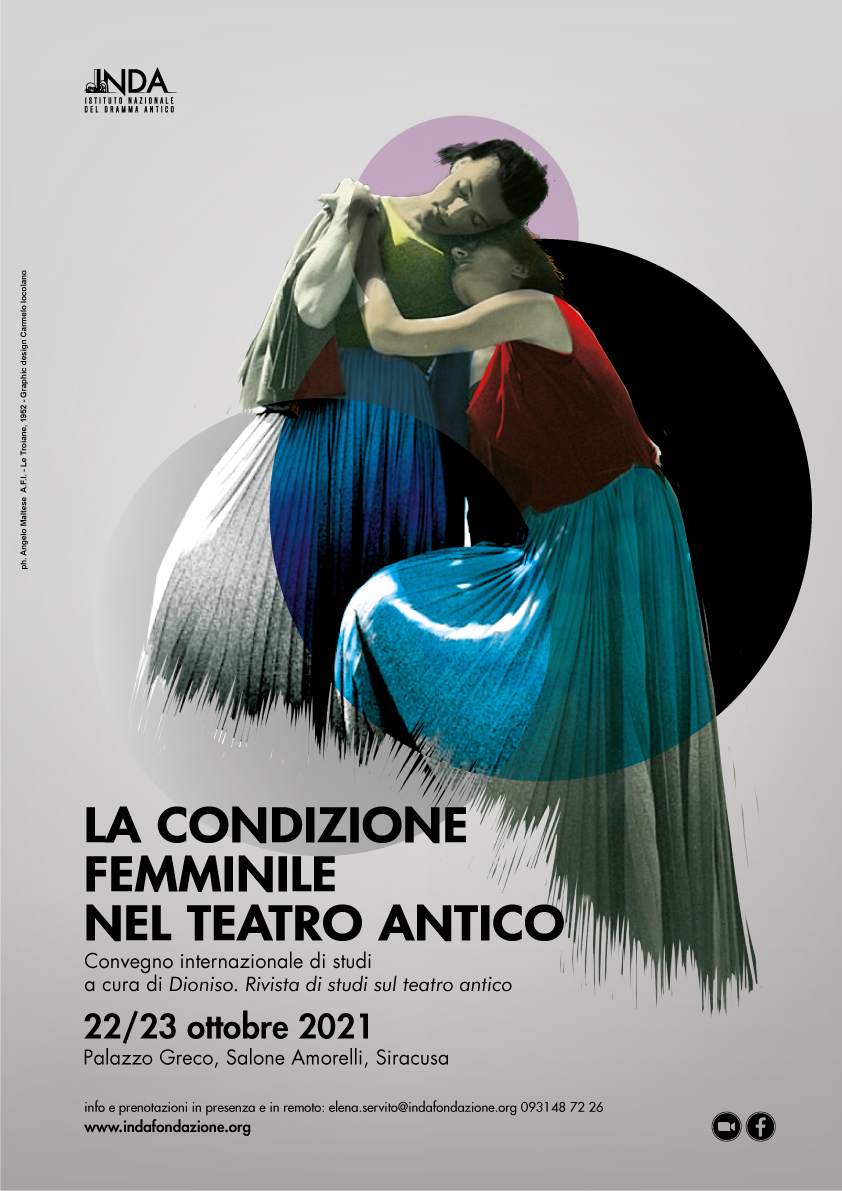
INDA
Congress
2021
The Feminine Condition
in the Ancient Theatre
International Conference of Studies
Edited by Dioniso. Journal of Studies on Ancient Theatre
The conference aims to answer, within its sectoral limits, a question that is indeed universal: how can art, literature and theatre contribute to the discussion of major historical and social problems? In this specific case, the problem is the largest and most peremptory relationship of domination known to mankind, that which half of the human race has always exercised over the other half. We will find, of course, that the dramas of classical Athens and republican and imperial Rome convey a coherent language and a macho code, but we will also find that the creative individuality of the individual text opens up glimpses and insinuates disturbing doubts far more often than is commonly believed. And these insights are themselves destined to become history, if not custom.
Guido Paduano
22 October at 9.15 a.m.
Institutional greetings
Francesco Italia President of the Inda Foundation
Marina Valensise Managing Director Inda Foundation
Antonio Calbi Superintendent Inda Foundation
Introduction
Guido Paduano Director of Dioniso. Magazine of studies on
ancient theatre
Session 1: Tragic women
Chair: Maria Serena Mirto (University of Pisa)
Giulia Sissa (UCLA): When woman is noble.
Theatre as gender theory
Giulia Maria Chesi (Humboldt Universität – Berlin): The dream
the mother’s dream and the son’s doubt in the Coefores: Orestes and his violent
his violent appropriation of Clytemnestra’s unconscious
Lucia De Giovanni (University of Bergamo): The wife and the
concubine: Deianira and Iole in ancient theatre
22 October at 3.30 p.m.
Session 2: Comic women
Chaired by Gianna Petrone
(University of Palermo)
Marcella Farioli (Université Paris-Est Créteil): Female threat,
gynaecophobia and ideology of the polis in 5th century theatre.
century theatre
Alessandro Grilli
(University of Pisa): Female comic heroism: Lysistrata
between desire and self-control
Amy Richlin (UCLA): Schrödinger’s Pussy: Slave Actors and Fluid Desire in Early Roman Comedy.
Fluid Desire in Early Roman Comedy
Maurizio Massimo Bianco (University of Palermo):
“Between Wife and Husband”: on the subject of Merc. 817ff.
23 October at 9.15 a.m.
Session 3: Reception
Chaired by Margherita Rubino (University of Genoa)
Caterina Mordeglia (University of Trento): Images of women
in Terence and Rosvita
Massimo Fusillo (University of L’Aquila): An aesthetics of vulnerability.
vulnerability. Feminist rewritings of Greek tragedy
(Cixous, Tempest)
Erika Fischer-Lichte (Freie Universität – Berlin): Changing
Places? – Antigone and Medea performances in the 1970s
Federico Sanguineti (University of Salerno):
Antichissimo Dante modernissimo: Homeric Virgilian Beatrice
Credits:
Organisational secretariat
Elena Servito- Francesco Morosi
Press Officer
Gaspare Urso
Graphic design
Carmelo Iocolano
Thanks to
Pamela La Mesa
Filippo Genovese
[email protected]
+39 0931 48 72 26
In view of the current health situation, the conference will be held in mixed mode, both in person and remotely. As provided for by the Ministry of Education, the teachers involved in the event, compatibly with the requirements of service and continuity of teaching, are exempt from duty on the days indicated above. The exemption from duty is valid only with the participation in the event, in presence or by connection on the zoom platform.

